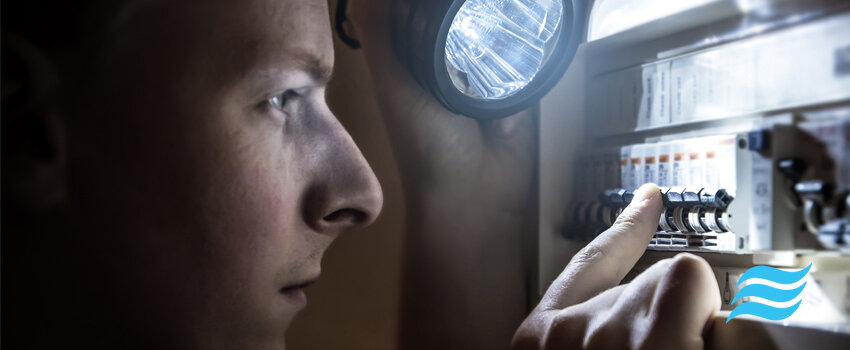
Troubleshooting Electrical Issues In Your Home
Freaking out because your lights are flickering? Don't worry, it's pretty unlikely your home is haunted – you probably just need an electrician. Troubleshooting electrical problems can be difficult, but here are a few tips that can help.
So, before you call the local priest, read through our troubleshooting guide below and find out the real causes behind some of the most common electrical problems around the home.
A quick word of advice – unless you're a qualified electrician, it's best to get a lot of these electrical problems looked over by a professional, you don't want to risk having a nasty accident.
Why Are My Lights Flickering?
Flickering lights are incredibly irritating to live with, but luckily they're usually easy enough to fix.
One of the most common causes of flickering lights is loose bulbs. Yes, you read that right – loose bulbs are the main cause of lights flickering.
- Before doing anything else, turn the light off at the switch, then make sure the bulb is screwed in correctly. It needs to be screwed in all the way, otherwise, it might flicker when switching on. If that didn't solve the problem, move onto step two.
- Check the bulb is the right wattage for the fitting (the wattage is written on both the bulb and the inside of the fixture). It might not sound like a big deal, but putting the wrong wattage bulb in a light fitting is incredibly dangerous. Forget the irritating flickering, a mismatched wattage bulb will overheat and can even catch fire.
- Neither of these solutions help? Replace the old bulb with a new one.
- If the light's still flickering, then it could be the electrical outlet or the cord that has a problem.
How To Inspect An Electrical Cord
Easily overlooked, having a damaged or frayed electrical cord on any of your electrical appliances can be a safety hazard.
Things to check for include:
- Any exposed electrical wires
- Frayed cords
- Damaged cord insulation
- Brown spots or melting (which means that there is a short)
If you notice a short, do not use the item anymore and you must get a licensed electrician to repair it for you – otherwise it could end up on fire.

Why Is My Circuit Breaker Tripping Repeatedly?
A circuit breaker is designed to protect you and your home, so when it does trip, that’s a sign it’s doing its job properly!
Usually, turning a tripped circuit breaker back on won’t cause any more issues, but if your breaker's turning itself off after being reset, it means there is an overload.
Overloaded circuit breakers are a fire hazard because they can overheat.
To figure out what's going on, switch off some of your electrical appliances and check to see if this solves the problem. Look at what you were using when it tripped. If it was a hair dryer, try using it on the lowest setting in the future. Alternatively, limit the electrical usage on a single circuit while high watt devices are in use.
It's important not to plug in multiple appliances to a single outlet and it's always a good idea to turn off any appliances you aren't using.
If turning off your appliances don't help, you might have a short circuit. This problem is dangerous and should not be taken lightly. Call in a licensed electrician to look into the problem and fix it right away.
Tips To Avoid Tripping Your Circuit Breaker
Avoid overloading your circuit by following these four tips:
- Never plug power boards into other power boards.
- Unplug electrical devices that aren’t in use. Even phone chargers still draw power when not connected to your phone – and a number of small drains on the circuit soon add up.
- Don't plug everything into a single circuit – spread your electrical appliances around.
- If it's not in use – unplug it. This is the same as number two, but it's worth repeating – not only will you ease the pressure on your circuit, you'll save money on your energy bill.
Why Are My Light Bulbs Burning Out So Quickly?
There are a number of reasons your light bulbs could be burning out too often, including:
- Their wattage is too high for the fixture they're in
- The electrical insulation is too close to the light
- Bad wiring on the circuit or the mains
Unfortunately, figuring out the root cause can be tricky for non-professionals. If you’re going through light bulbs like nobody’s business, it might be worth reaching out to an electrician to help solve the mystery.
How Can I Reduce My Electric Bill?
There are a few ways to help reduce your electric bill – these can include:
- Switching to a lower-priced provider
- Figuring out what electrical devices are heavy power drains
- Unplugging appliances and chargers when not in use
- Repairing any damaged wiring or circuits
- Consider installing solar panels (they’re pricey to install but save you money long term)
Of course, every home is different and what might work for you, won’t work for another household.
Well, there are our answers to some of the most common electrical questions we encounter on a daily basis!
Remember, for a lot of electrical problems, you really don't want to risk fixing it yourself. You need a master electrician who will listen to the problem, troubleshoot, advise on the solution and be able to do the work you need – all while keeping everything up to code and installed beautifully.
Here at Nichols & Phipps, we provide a shockingly simple electrical service.
